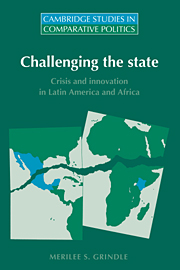Book contents
- Frontmatter
- Contents
- List of figures
- List of tables
- Acknowledgments
- 1 Challenging the state: a decade of crisis
- 2 Crisis and the state: evidence from Latin America and Africa
- 3 Crisis and breakdown in Mexico and Kenya
- 4 Imposing state authority
- 5 Managing the economy
- 6 Administering the public good
- 7 Responding to society
- 8 States of change
- Notes
- References
- Index
3 - Crisis and breakdown in Mexico and Kenya
Published online by Cambridge University Press: 27 August 2009
- Frontmatter
- Contents
- List of figures
- List of tables
- Acknowledgments
- 1 Challenging the state: a decade of crisis
- 2 Crisis and the state: evidence from Latin America and Africa
- 3 Crisis and breakdown in Mexico and Kenya
- 4 Imposing state authority
- 5 Managing the economy
- 6 Administering the public good
- 7 Responding to society
- 8 States of change
- Notes
- References
- Index
Summary
Prior to the 1980s, Mexico and Kenya had strong reputations for effective state-led economic development and sustained state-dominated political stability in their respective continents. This chapter documents the extent to which expectations based on these reputations eroded and then broke down. The experiences of the two countries differ, yet the combined effect of economic and political change altered the context for state action in similar ways. In Mexico, the interaction of economic and political conditions indicates that economic crisis sharpened and accelerated an emergent political crisis. In contrast, Kenya provides a case of a country whose political crisis contributed significantly to deepening its economic problems.
Deep and sustained economic crisis has farreaching consequences, as the case of Mexico explored here demonstrates. Although most frequently measured and discussed in terms of stagnant or declining rates of growth and indices of social welfare, extended economic crises also stimulate critical reassessment of the intellectual underpinnings of national development strategies. Such crises encourage citizens, policy makers, and politicians to question prior growth strategies and policy regimes, even those that had produced positive results in the past. In consequence, long-accepted notions about how development is best achieved become subject to greater skepticism and at times are held responsible for creating current conditions.
Along with this questioning of appropriate routes to development, sustained economic crisis also has a profound impact on the economic interests supporting and benefiting from existing policies.
- Type
- Chapter
- Information
- Challenging the StateCrisis and Innovation in Latin America and Africa, pp. 47 - 78Publisher: Cambridge University PressPrint publication year: 1996

